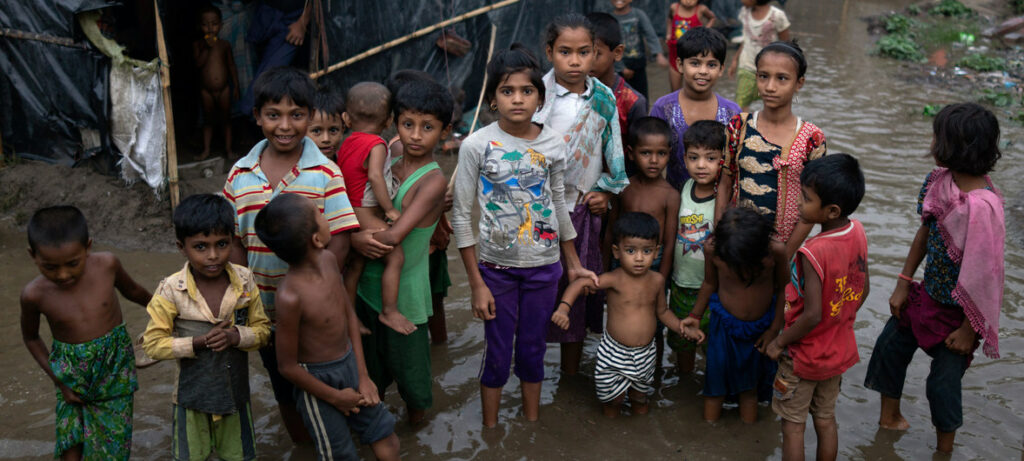Myanmar: ‘Multidimensional and Long-Standing’ Root Causes behind Rights Minority Abuses, Says Bachelet
ASIA-UPDATES ON MYANMAR ROHINGYA GENOCIDE, 2 Mar 2020
UN News - TRANSCEND Media Service
27 Feb 2020 – The Human Rights Council today held an interactive dialogue with UN rights chief, Michelle Bachelet, on the root causes of violations and abuses suffered by the Rohingya mainly-Muslim minority and other minorities in Myanmar. She said the Government now has a historic opportunity to counteract systematic violations, “by bringing its people together, as one”.
The High Commissioner also presented her oral update, as well as country reports of the Secretary-General and the Office of the High Commissioner for Human Rights (OHCHR), followed by a general debate.
Ms. Bachelet said she welcomed the engagement and constructive input of the Government of Myanmar in the compilation of the report.
She reminded Member States that for over half a century, the policies of Myanmar had discriminated against religious and ethnic minorities.

Pictured here, Rohingya refugee children wade through flood waters surrounding their families’ shelters following an intense pre-monsoon storm in Shamlapur makeshift settlemen in Cox’s Bazar district, Bangladesh.
UNICEF/UN0213967/Sokol
Women and girls heavily impacted
Democratic deficits, entrenched impunity, weak rule of law and the lack of civilian oversight had all contributed to human rights abuses in Myanmar, Ms. Bachelet noted, adding that women and girls were especially impacted as a result of sexual and gender-based violence.
Government policies “have contributed to and perpetuated violence, extreme poverty, exploitation and dispossession. Notably, the 1982 Citizenship Law rendered stateless a significant proportion of the Rohingya and other Muslims, compounding their vulnerability”, she said.
She added that the “root causes of these violations are complex, multi-dimensional and long-standing. Unpacking and untangling this multi-faceted human rights challenge requires understanding the historical, political, economic and social dimensions as a prerequisite to identifying solutions.”
During discussions, speakers welcomed the recent provisional order of the International Court of Justice (ICJ) that called on Myanmar to take emergency measures to protect Rohingya from genocide and prevent destruction of evidence related to genocide. Some speakers said it was clear that accountability efforts at the international level had been fostered by the absence of meaningful prospects for accountability at the domestic level.
Others acknowledged Myanmar’s own efforts to investigate violations, including through the Independent Commission of Inquiry, and to look at the causes of violence, noting that Myanmar had a historic opportunity to develop a strong minority right and non-discrimination regime that recognized, protected and fulfilled the rights of all. They called on the international community to act constructively and provide technical assistance as a complement to Myanmar’s efforts to address the situation in Rakhine.
Social media access sees extremist views flourish
Ms. Bachelet said that the “recent upsurge of xenophobia and violence can also be partly attributed to the stresses and uncertainties of Myanmar’s current transition from decades of authoritarian rule”, noting that “the dramatic expansion of public access to social media has enabled extremist and ultra-nationalist movements to propagate messages inciting hatred and violence, fuelling communal tensions.
“I urge the Government to take action to address escalating prejudice and incitement against Rohingya Muslims and other minority communities”, she added.
Updates, country reports
At the beginning of the meeting, the High Commissioner presented her oral update on the work of her Office and its approach to recent human rights developments around the world.
Speaking of foreign individuals with suspected ties to extremist group ISIL, the High Commissioner noted that unless they were to be prosecuted for recognized crimes, they had to be repatriated to their countries of origin.
The rights chief also presented country reports on the human rights situations in Colombia, Cyprus, Guatemala, Honduras, Iran and Sri Lanka, as well as oral updates on Eritrea, Nicaragua, Yemen, and technical cooperation in Venezuela.
Colombia, Guatemala, Honduras, Cyprus, Iran, Nicaragua, Venezuela, Yemen, Sri Lanka and Eritrea spoke as concerned countries.
The meetings of the forty-third regular session of the Human Rights Council can be followed on the webcast of UN Web TV.
Tags: Asia, Aung San Suu Kyi, Bangladesh, Buddhism, Burma/Myanmar, Cultural violence, Direct violence, Ethnic Cleansing, Free Rohingya Coalition, Genocide, History, Human Rights, International Court of Justice ICJ, Justice, Maung Zarni, Racism, Religion, Rohingya, Social justice, Structural violence, United Nations
DISCLAIMER: The statements, views and opinions expressed in pieces republished here are solely those of the authors and do not necessarily represent those of TMS. In accordance with title 17 U.S.C. section 107, this material is distributed without profit to those who have expressed a prior interest in receiving the included information for research and educational purposes. TMS has no affiliation whatsoever with the originator of this article nor is TMS endorsed or sponsored by the originator. “GO TO ORIGINAL” links are provided as a convenience to our readers and allow for verification of authenticity. However, as originating pages are often updated by their originating host sites, the versions posted may not match the versions our readers view when clicking the “GO TO ORIGINAL” links. This site contains copyrighted material the use of which has not always been specifically authorized by the copyright owner. We are making such material available in our efforts to advance understanding of environmental, political, human rights, economic, democracy, scientific, and social justice issues, etc. We believe this constitutes a ‘fair use’ of any such copyrighted material as provided for in section 107 of the US Copyright Law. In accordance with Title 17 U.S.C. Section 107, the material on this site is distributed without profit to those who have expressed a prior interest in receiving the included information for research and educational purposes. For more information go to: http://www.law.cornell.edu/uscode/17/107.shtml. If you wish to use copyrighted material from this site for purposes of your own that go beyond ‘fair use’, you must obtain permission from the copyright owner.
Read more
Click here to go to the current weekly digest or pick another article:
ASIA-UPDATES ON MYANMAR ROHINGYA GENOCIDE: